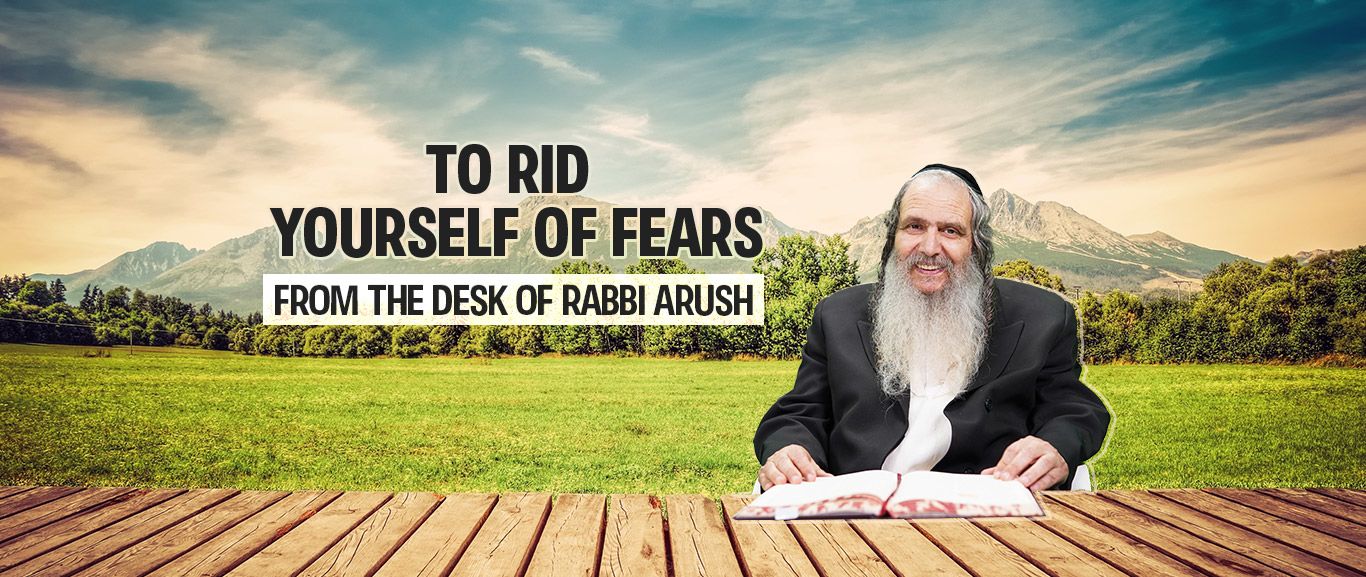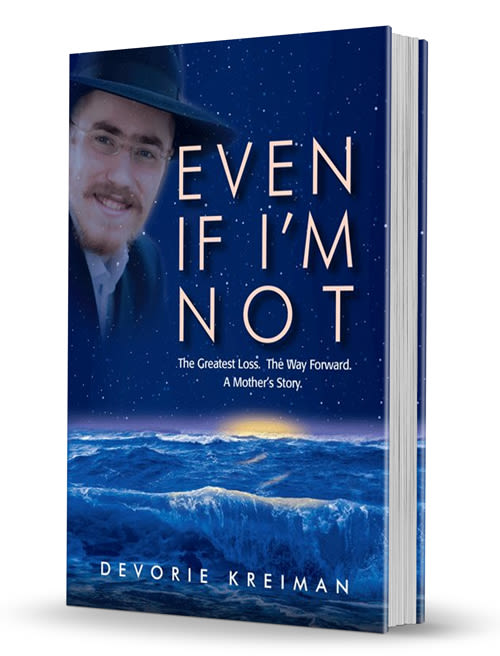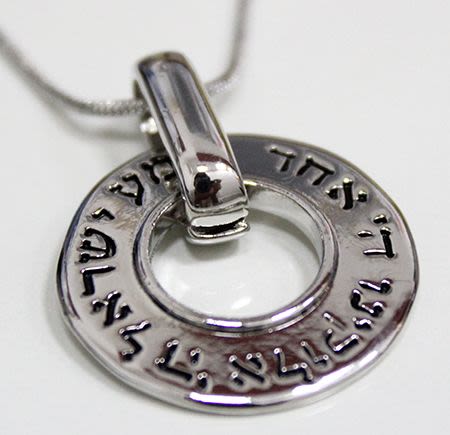
To Rid Yourself of Fears
In these tumultuous times of deep uncertainty, how can we truly and finally rid ourselves of our anxieties? Rabbi Arush gives tremendous insight and advice how to achieve inner quiet.

Translated from Rabbi Arush’s feature article in the weekly Chut shel Chessed newsletter. The articles focus on his main message: “Loving others as yourself” and emuna.
Inexplicable Fears
Many years ago, a friend came to me and told me that he was suffering from anxiety. I asked him, “What are you afraid of?” He began to tell me about all kinds of illusory thoughts that were pursuing him on a regular basis. I asked him: “Are you afraid right now?”, and he said that yes, he is stressed, his heart is pounding, and he is sweating as if he is being pursued by a terrorist.
I wanted to understand these feelings of his and said to him, “But you see that only you and me are here, and that you are in no danger…” To which he replied, “True, I understand that in my mind. You perhaps will not understand, but that really doesn’t help me; these imaginary fears are stronger than me and they are making my life miserable…”
I talked to him a bit about emuna (faith) and advised him to do teshuva (repent) on the sin of lashon hara (harmful speech). The friend was very surprised: “What’s the connection? How did you get from anxieties to lashon hara? If you have some source for it, then fine, but we know that Hashem runs the world according to the measure-for-measure principle. Where is the measure-for-measure here?”
I opened him the book Likutei Moharan, written by Rabbi Nachman of Breslev, who besides being a tzaddik (righteous person) and having immense spiritual understanding, was accepted by all as one of the greatest psychologists ever. In Likutei Moharan 54:5, he says:
“And the power of imagination comes via lashon hara because the power of imagination is the beastly power, because even a beast has a capacity for imagination. And one who brings an evil report falls into beastliness, and therefore the power of imagination overcomes him, which is the beastly force. And when the daat (wisdom) goes away from him, he falls from the love of Hashem Yitbarach and falls into the love of beastliness.”
I explained to this man: “You yourself say that you know that all your fears and anxieties are imaginary. Even in a closed and locked house you are afraid; and even if the entire army and police force were protecting you – you would be afraid. And you know it comes from a strong imagination that is going wild within you. So now you have the words of Rabbi Nachman that say explicitly that what increases all these imaginary thoughts is the lashon hara, and that is the connection to your problem.”
It’s Not Your Business!
The friend talking to me began to soften. “Okay,” he said, “it is indeed written here. But I was asking also about the logic behind it. What is there in lashon hara that strengthens one’s imagination?”
“An excellent question,” I replied. “And it’s good you asked. Because it is indeed very important to understand what is so severe about lashon hara, what is so bad about it. You should know that when speaking lashon hara, one is engaging in illusions. You have no idea what’s going on in the life of another person, and you shouldn’t be at all interested in it. You have your path in this life, and all that you should be interested in is working on yourself and improving yourself. When a person views his fellow unfavorably, and sees the bad in him, and of course when he says negative things about him – that comes from his imagination and falsehood. And when you increase your imaginary thoughts and allow them free rein, you see for yourself this unfortunate result: they go wild and disturb you.
“You should know that the same way you have no explanation for your fears, so too you have no explanation why one must involve himself in another person’s life. What does it have to do with me? What difference does it make in my life? Rabbi Levi Yitzchak Bender, the elder Breslev chasid in the previous generation used to say: ‘When a person is looking at himself, how does he have time to look at others?’ And the chassidim would say: ‘A believing Jew talks only about the Holy One, Blessed Be He, or to the Holy One, Blessed Be He!’
“Therefore, the deep teshuva on the vice of lashon hara – is emuna (faith)! To believe that there is no other but Hashem. There are no people. Hashem is good, and all human beings are good because they were created in the image of G-d. If you see people, search only for the good in them, the beauty in them, their good points; think only how to do good for them and help them. besides this, everything is nonsense, falsehood and imaginary!”
The Supreme Light is Blocked to You
I spoke from my heart, and, thankfully, my words entered his heart, and he devoted a significant part of his daily hitbodedut to teshuva and cheshbon nefesh (taking account of) the blemish of lashon hara. He began to learn the laws regarding it and to be aware of what was coming out of his mouth. He reached the point where it seemed strange to him to speak of others at all; and not so long after this, he told me that he had indeed rid himself of the anxieties.
For years he had had treatments and had taken medication – but what worked in the end was the simple teshuva on lashon hara. Instead of taking an aspirin or affixing a band-aid, he dealt with the source of the problem, and not only did the anxiety go away, but his entire life changed for the better because he began to live a life of emuna!
In parashat Tazria, we learn about the tzaraat (commonly translated as leprosy), which is a terrible disease that comes because the person spoke lashon hara. The person is banished from the camp; he cannot be among people! He is sent out from all the camps! It’s worse than all other types of tumah. Why?
Lashon hara doesn’t seem like such a severe sin. A person thinks: “What did I do? What’s so bad? All I did was talk… joke a bit… and all in all, I didn’t lie. It really is like that.” And yet we see that the Torah and Chazal relate to lashon hara as being an extremely severe transgression.
The holy Zohar says fearful things: All the sublime light is blocked to such a person; all the supreme good is blocked to him. Everything is blocked to him. Chazal say that lashon hara is worse than idol worship, immorality and bloodshed put together – what can be worse than that?
Not to Lose Heart
Rabbi Nachman’s teaching explains the deep aspect of it: Lashon hara enhances the power of imagination in a person and makes him animal-like. Please forgive my language: he becomes a two-legged animal. He can seem intelligent and say reasonable things and give wonderful explanations – and yet, he is under the complete control of beastliness and illusions. He is completely disconnected from the intellect and the daat – and from Hashem. If he doesn’t do teshuva on that vice, he has no chance of having a real connection with Hashem, with emuna, and with kedusha.
In addition, he loses his love of Hashem. All mitzvot are done with yirah and ahavah (fear and love). Without love of Hashem, even if he performs mitzvot, his heart will not be there. Every transgression causes a fault in one of the body parts, but lashon hara causes a fault in the brain and the heart. It ruins the centers of a person’s personality and wrecks his life completely. That is why lashon hara is such a severe transgression.
Engage With the Good – and Obtain Good
Dear Jews, emuna is everything. The emuna is all the good, all the light in life, and the key to happiness in life. A free person, who is truly healthy emotionally, thinks only good things about other people; he views them with a good and loving eye; thinks only how to do good for them and help them; he has no bad thoughts, he doesn’t create a reality out of any evil in any person even when someone harms him – and that is the key to a happy, healthy life, free of anxiety.
For to see people, to look at them, to think of them, to judge them unfavorably, to judge people’s deeds – is completely falsehood and imagined!
You know for yourself that you have behaviors that you have no control over; you have things that you have inherited from the environment and the place where you grew up, but you also have good desires and a holy soul that wants only good. And you want others to see the good in you. You, too, are supposed to judge yourself favorably and see the good in yourself, and not look at the bad, chalila. And not because you are “working on yourself”, but because that is the truth – that your neshama is very holy. Evil is only a lie, imagined and a deception. And that is exactly how you are to view every Jew: He is a part of G-d in Heaven! He has a holy soul and good and holy wishes! He is good! Aside from that I don’t know anything. When we view ourselves and every Jew only in the light of the intellect and emuna and not in the light of falsehood and imagination – we will merit an abundance of light and good and blessing.












1/16/2025
Life changing read! Finally I discovered the root of some trouble in my life B”H.
Todo lo bueno para Rav Arush y su equipo
5/17/2023
thank you so much for this, i have struggled with not lashon hara of others, but basically thinking negatively of others just as a result of low self esteem and other insecurities i developed growing up. although i am careful not to speak any lashon hara i have been struggling all my life to stop by uncontrollable habit, thinking negatively and putting people down in my mind. i just simply don’t know how to do it. i don’t see myself having the time or patience to undo and unravel each negative thought that projects in my mind so quickly, it seems like it would be tiresome and exhausting, my best bet after reading this would be to pray for help and to simply try not to look at others intentionally as a subconscious reminder, until i am ready to use everything hashem gave me letovah.. thanks for listening!